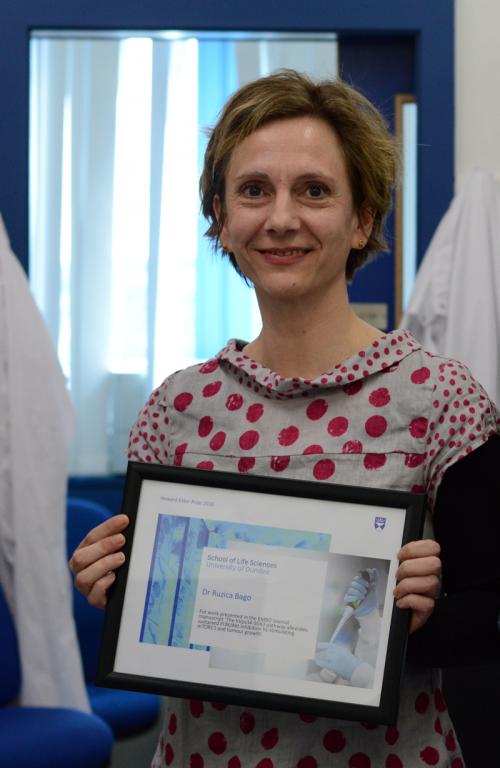
Congratulations to Ruzica Bago, who is completing her postdoctoral work in Dario Alessi’s lab, on being awarded the University of Dundee School of Life Sciences prestigious Howard Elder Prize for 2016.
Ruzica received the award for her EMBO J publication entitled “The hVps34-SGK3 pathway alleviates sustained PI3K/Akt inhibition by stimulating mTORC1 and tumour growth”.
PI3K and Akt inhibitors are being evaluated in clinical trials for the treatment of human tumours including breast cancer that display driver mutations that inappropriately elevate the PI3K/Akt signalling pathway. Despite initial promise, the majority of these tumours unfortunately rapidly develop resistance the PI3K/Akt pathway therapy. Ruzica Bago, decided to explore the mechanisms by which cancer cells can evolve resistance to PI3K and Akt pathway inhibitors within 2-5 days. Ruzica discovered that prolonged treatment of a panel of breast cancer cells lines for over 2-days with PI3K or Akt inhibitors, led to a marked increase in the expression and activity of a poorly studied protein kinase termed the serum and glucocorticoid-regulated kinase-3 (SGK3), that is closely related to Akt and also activated by the same upstream kinases (PDK1 and mTORC2). Akt kinase possesses a PH domain at its N-terminus that binds to the lipid second messenger PtdIns(3,4, 5)P3 product generated by PI3K, which induces a conformational change promoting phosphorylation and activation of Akt by PDK1 and mTORC2. In contrast, SGK3 instead of a PH domain at its N-terminus possesses another lipid interacting motif termed a PX domain, that binds to PtdIns(3)P-and not PtdIns(3,4, 5)P3. SGK3 is the only known protein kinase to possess a PtdIns(3)P binding domain.
Ruzica then demonstrated that SGK3 was activated in an analogous mechanism to Akt, namely that PtdIns(3)P-binding to the PX domain promoted PDK1 phosphorylation and hence activation of SGK3. This effect is prevented by introducing a mutation within the PX domain that prevents SGK3 from binding to PtdIns(3)P. These findings raised the question as to what was the identity of the lipid kinase in the cell that generates the PtdIns(3)P that stimulates the activation of SGK3 in breast cancer cell lines treated with PI3K or Akt inhibitors. Employing structurally diverse highly selective inhibitors, Ruzica experiments strongly point towards an enzyme termed hVps34, which is one of the major lipid kinase in the cell that generates PtdIns(3)P that is located at endosomes of cells at the same location SGK3 residues.
Given the similarity between Akt and SGK3, Ruzica realised that these kinases could phosphorylate an overlapping set of substrates. Employing an Akt phosphorylation motif antibody-Ruzica found that out of 9 Akt substrates identified in a cell extract 6 of these were likely to be phosphorylated by both Akt and SGK3. Strikingly, Ruzica was able to show that prolonged inhibition of PI3K/Akt enabled SGK3 to fully reactivate the mTORC1 signalling pathway by phosphorylating TSC2. Under these conditions of prolonged treatment with PI3K or Akt inhibitors Ruzica established that mTORC1 activation is now blocked by 14h SGK inhibitor. In collaboration with another postdoc Pau Castel working in the laboratory of José Baselga working at the Memorial Sloan Kettering Cancer Center, they were able to produce decisive data showing that a combination of Akt (MK-2206) and SGK (14h) inhibitors induced marked regression of a breast cancer (BT-474) cell derived tumours in a nude mouse xenograft model, under conditions where either inhibitor administered individually had minimal effects.
Ruzica’s results highlight the importance of the hVps34-SGK3 pathway and suggest it represents a major mechanism, which cells utilise to counteract inhibition of PI3K-Akt signalling. They also provide novel mechanistic insights of how PtdIns(3)P can stimulate activation of SGK3. The characterisation of the 14h SGK inhibitor suggests that it will become a useful research tool to probe biology controlled by SGK isoforms. 14h represents a valuable addition to our growing arsenal of signal transduction inhibitors to dissect functional roles of protein kinases. Finally, and perhaps most importantly findings described in Ruzica’s paper highlight the therapeutic potential of a strategy targeting both the Akt and SGK kinases for the treatment of cancer.
The Howard Elder Prize was endowed by Dr Alison Burt 25 years ago, in memory of her father Dr Howard Elder, who was a former medical graduate of the University of Dundee. The prize is awarded to a postgraduate student or postdoctoral researcher deemed to have published the most significant paper in an area related to cancer research. It was introduced by Dr Elder's daughter who said her father always spoke very highly of his time at Dundee and the opportunities it gave him. The panel, consisting of researchers based in the Division of Cancer Research at the School of Medicine (Professor Kevin Hiom, Professor Albena Dinkova-Kostova and Dr Adrian Saurin), believe that "Dr Bago’s work provides a great example of how detailed understanding of basic biology can be employed for the improvement of human health".
Ruzica is the 6th MRC PPU researcher to be awarded the Howard Elder prize. The previous awardees were Xu Huang 2008, Elton Zeqiraj 2009, Craig MacKay 2010, Kumara Dissanayake 2011 and Marija Maric 2014.

